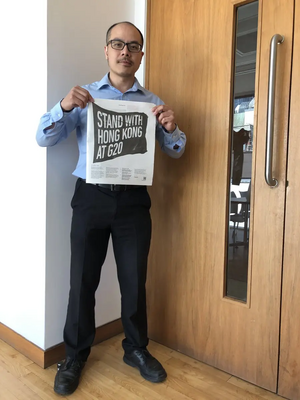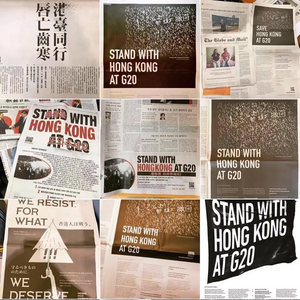Global advert for HK Anti Extradition Bill - implications for the Remain campaign?

An advertisement to support the Hong Kong Anti Extradition Movement appeared in 14 newspapers around the world on 27th June. The press was puzzled by 2 questions: who created the campaign and how did they manage to execute it?
2 million Hong Kong citizens participated in the Hong Kong anti extradition bill protest on 21st June. The protesters made 3 demands: 1. the amendment of the bill to be retracted; 2. the definition of the clashes between police and civilians on 12th June as 'riot' to be retracted; and 3. an independent commission to be formed in order to investigate the police behaviour on 12th June. The Hong Kong government was forced to postpone the legislation of the bill. However, most of the demands from the protesters have not been met, so the protests turned into a long term civil disobedience movement, and a significant portion of protesters now demand the resignation of the Chief Executive, Carrie Lam.
Most people in Hong Kong now believe that the result of the movement will largely depend on the support from foreign countries, particularly when G20 summit takes place on 28th June. Some countries such as Germany and United States have already stated they would raise the Hong Kong issue during the Summit, despite the Chinese government strongly demanding the issue not be raised.

Therefore, activists on social forum 連登 in Hong Kong organised a crowdfunding campaign to create a global advertising campaign for major newspapers in the world. In the beginning the campaigner planned to raise HKD 5 million, but within half a day, he managed to collect HKD 6.7 million! The draft of the advert was finished within a day, and it was published in over 14 newspapers across the world by the next day with different designs and layouts.
The campaign was impressive not only because of its efficiency and the simplicity of the message, it was also magnificent in overcoming complex legal issues, translation issues, and the different advertising cultures. The images used in the adverts were different to suit local cultures. For example, the Japanese version was more cartoonish, the British version included a big flag, and the Korean version had Korean words printed over the headline banner.
This campaign can be regarded as a world class performance and it showcased the efficiency of Hong Kongers. The next question would be: can we Liberal Democrats learn something from this campaign?
We had a successful campaign in the local and EU elections in May, can we improve on our efficiency in tackling campaigning issues? Can we use crowdfunding more efficiently? Our message was simple in the EU election but can we be more creative when we deliver our Remain in EU message?
This advertising campaign told us a successful movement can be built from nothing. It is just about choosing the right channel to deliver the message, and with an efficient project management to execute it.
P.S. We have incorrectly reported the campaign was organised by one of the activists (石賈墨) on the social forum instead of the collective effort of the whole forum, thanks 石賈墨 for pointing it out. It has since been corrected.
